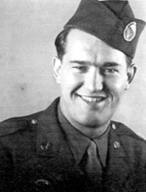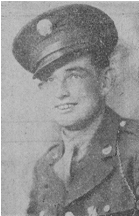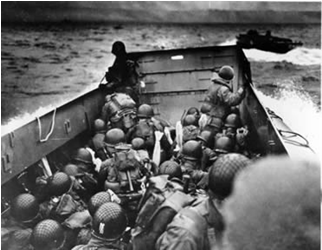Brightwood Boys, The History of the Men from
the North End of
Springfield, Massachusetts,
During World War II
by Christopher P. Montagna
CHAPTER 15
INVASION
As D-Day approached, the USNAAB at Dartmouth became increasingly busy. Finally,
on June 1, 1944 US troops and their equipment were loaded onto their transport craft for the last time and the great armada waited on the southern coast of England until storms that swept through the English Channel had abated and orders were received from the Supreme Allied Headquarters. The departure of ships for training and maneuver exercises was not uncommon to the base. During the early morning hours of June 6, 1944, as Adam Montagna patrolled the base at Dartmouth, an announcement was broadcast over the station’s speaker system:
"Soldiers, Sailors and Airmen of the Allied Expeditionary Force!
You are about to embark upon the Great Crusade, toward which we have striven these many months. The eyes of the world are upon you. The hopes and prayers of liberty-loving people everywhere march with you. In company with our brave Allies and brothers-in-arms on other Fronts, you will bring about the destruction of the German war machine, the elimination of Nazi tyranny over the oppressed peoples of Europe, and security for ourselves in a free world.
Your task will not be an easy one. Your enemy is well trained, well equipped and battle hardened. He will fight savagely.
But this is the year 1944! Much has happened since the Nazi triumphs of 1940-41. The United Nations have inflicted upon the Germans great defeats, in open battle, man-to-man. Our air offensive has seriously reduced their strength in the air and their capacity to wage war on the ground. Our Home Fronts have given us an overwhelming superiority in weapons and munitions of war, and placed at our disposal great reserves of trained fighting men. The tide has turned! The free men of the world are marching together to Victory!
I have full confidence in your courage and devotion to duty and skill in battle. We will accept nothing less than full Victory!
Good luck! And let us beseech the blessing of Almighty God upon this great and noble undertaking."
 While the announcement was being read, elements of the 506th Parachute Infantry Regiment (PIR), 101st Airborne Division were making pre-dawn jumps in France. The history of the 506th PIR is well documented in Stephen Amborse’s book, "Band of Brothers". The troops began the invasion by air. One of the paratroopers landing on French soil was Roland Baribeau. Roland, the son of Germaine Baribeau grew-up on Osgood Street. At the time of his enlistment, Roland was living at 27 Grosvenor Street with his wife Helen (Patterson) and two sons Roland and Gary.
While the announcement was being read, elements of the 506th Parachute Infantry Regiment (PIR), 101st Airborne Division were making pre-dawn jumps in France. The history of the 506th PIR is well documented in Stephen Amborse’s book, "Band of Brothers". The troops began the invasion by air. One of the paratroopers landing on French soil was Roland Baribeau. Roland, the son of Germaine Baribeau grew-up on Osgood Street. At the time of his enlistment, Roland was living at 27 Grosvenor Street with his wife Helen (Patterson) and two sons Roland and Gary.
Roland, who was born in Canada, was granted US citizenship on May 19, 1944 while serving in London, England. Roland Baribeau, a member of the HQ Company and designated as a demolition expert, was part of a group of men that became known as the “Filthy Thirteen”. The December 4, 1944 edition of the Springfield Daily Republican published an article describing the group:
Who are the "Filthy thirteen"? Officially they are members of the first demolition section of regimental headquarters company, 506th parachute infantry regiment. Unofficially, they are a band of sportsmen and deer poachers. Actually they form on of the most individualistic groups in the most individualistic army in the field. They represent the country from Massachusetts to California, Washington to Alabama; they represent all peoples and all religions and, as is only right, their leader is part native Indian.
Their pet dislike was undressing for bed…they climbed under their blankets fully clothed, jackets and parachute boots included. With their dislike for water they developed a complete disregard for normal behavior.
Just before 1 a.m. June 6, five hours before the official opening of the world explosion called H-hour, D-Day the plans carrying the paratroopers felt the wind and impact of enemy shells. The Filthy Thirteen, toughened by their training and personalities went forth into battle.
Roland Baribeau survived the initial landing on D-Day. However, as the 506th made its advance across Normandy, Roland was killed in action on June 21, 1944.
After the paratrooper landed, the Navy and Coast Guard began landing troops from the sea.  Wallace T. “Wally” Anderson, the son of John and Ethel Anderson, lived on Portland Street. Prior to the war he worked as a shipping clerk. Wally enlisted in the Army on November 17, 1942 along with his childhood friend William Munzert. William was the son of William and Mildred Munzert who lived at 35 Greenwich Street.
Wallace T. “Wally” Anderson, the son of John and Ethel Anderson, lived on Portland Street. Prior to the war he worked as a shipping clerk. Wally enlisted in the Army on November 17, 1942 along with his childhood friend William Munzert. William was the son of William and Mildred Munzert who lived at 35 Greenwich Street.
Wally Anderson embarked for the ETO on March 23, 1944 and was assigned as a replacement to Company C of the 16th Infantry Regiment, as part of the US 1st Infantry Division (Big Red One). On the morning of June 6, 1944, Wally Anderson was serving as a Sergeant with Company C, 16th Infantry Regiment of the 1st Infantry Division. At approximately 7:30 am (H+70) Wally Anderson’s C Company, part of the 1st Battalion, started landing on Omaha Beach under intense enemy artillery and machine gun fire from the high ground. They were able to clean the high ground overlooking the beach of enemy. The company was then given the mission to move east toward Colleville-Sur-Mer.
 Wally’s Company advanced without serious opposition. By the night, of June 6, the company reached positions to the West and North of Colleville sur Mer, where they dug in and repulsed enemy counter attacks during the evening and into the night. Day one of the invasion of Europe had ended.
Wally’s Company advanced without serious opposition. By the night, of June 6, the company reached positions to the West and North of Colleville sur Mer, where they dug in and repulsed enemy counter attacks during the evening and into the night. Day one of the invasion of Europe had ended.
Like many communities across the United States, the Brightwood section of Springfield would not survive the invasion unscathed. Fighting along with the 29th Division was a young private named Harold Weber. Harold, the son of Joseph and Minnie Weber, spent a few of his childhood years living at 16 Hebron Street. Harold was living with his parents on Hollywood Street in the “X” Section of the City when he enlisted in the Army on February 18, 1943. At the time of the invasion, Harold Weber was serving with Company A, First Battalion, 116th Infantry Regiment, 29th Division. At 7:00 AM, Pvt. Harold Weber was in a wave of amphibious landing craft heading for Omaha Beach. Soon after landing on the beach, Harold suffered a fatal wound to his head.